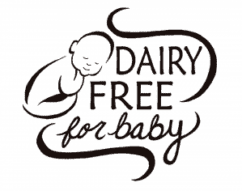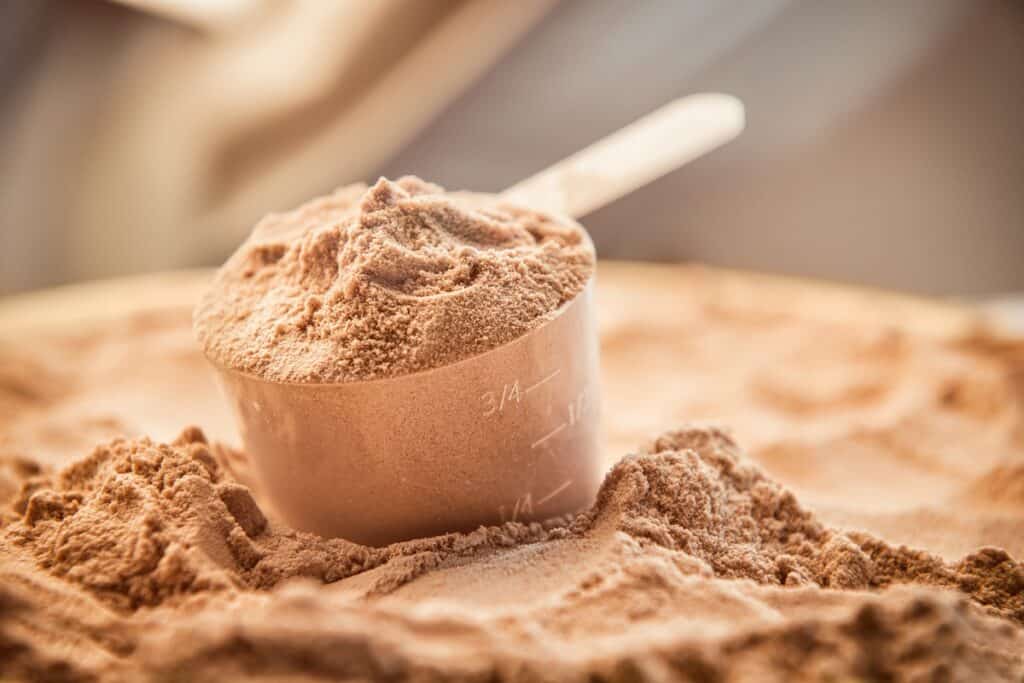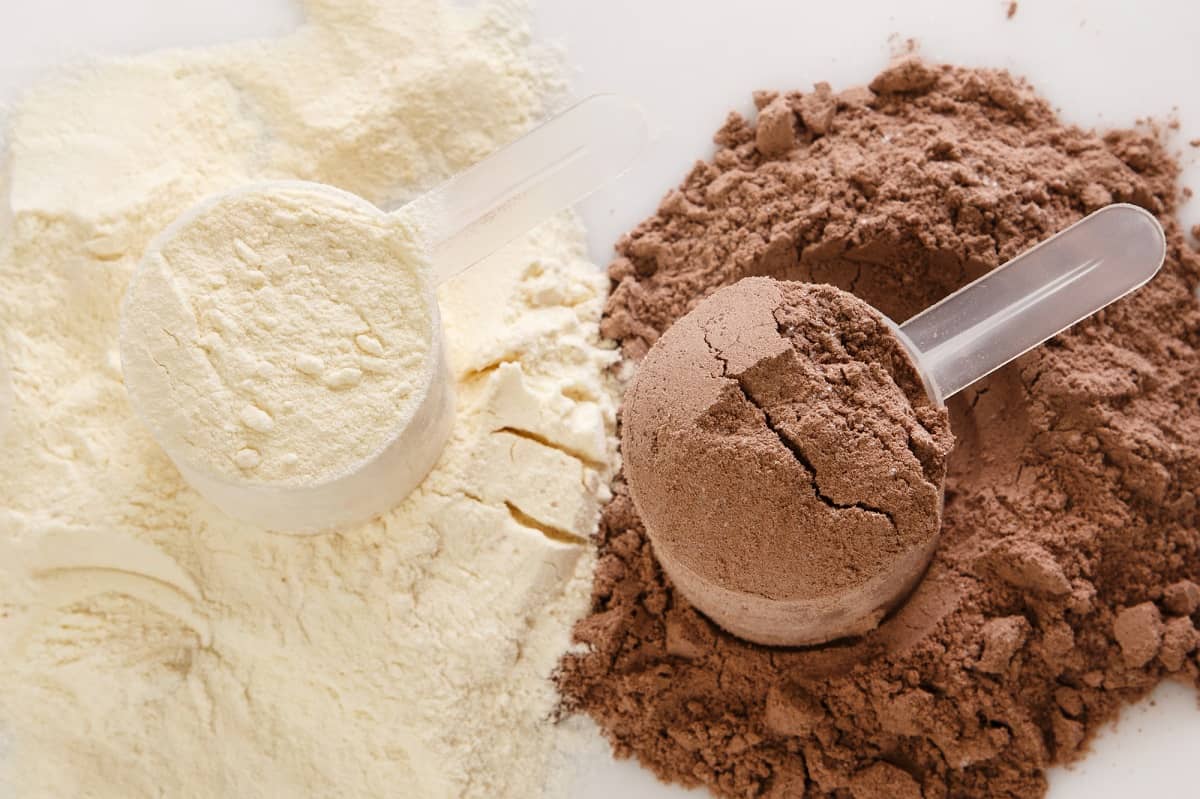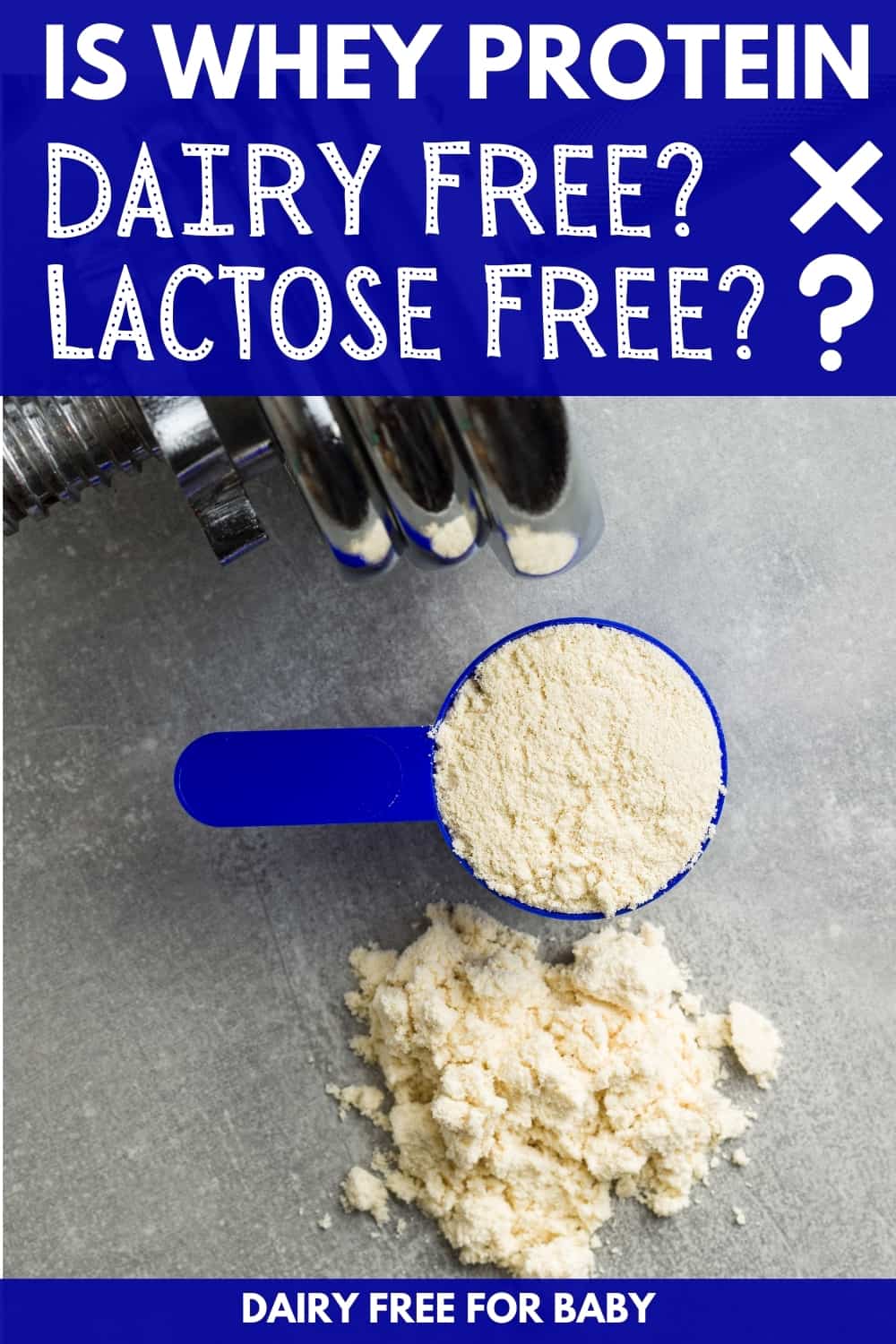Whether you have a dairy allergy or lactose intolerance, you may be wondering – is whey protein dairy free? Unfortunately, whey protein is derived from dairy products. While some whey protein products are suitable for those with lactose intolerance, they should not be consumed at all by those with a dairy allergy.
Disclaimer: This post is written and reviewed by Chrissy Carroll, MPH, RD. This is for informational purposes only and is not intended to be dietary advice. Consult a doctor or dietitian for any nutrition questions you may have.
What is whey protein?
Whey protein is a powdered protein product derived from dairy.
Cow’s milk contains two categories of protein – casein and whey. A whey protein powder just contains that one type of protein. Whey is very bioavailable, mixes well into drinks or smoothies, and has a fairly neutral taste. It also has an ideal balance of amino acids when it comes to post-workout use.
As a note, there are also casein protein powders on the market too, which are also derived from dairy. Whey protein is usually absorbed quickly, while casein protein is slower to digest.
Is whey protein dairy free?
No. Whey protein is derived from milk. It is not safe for people with dairy allergies to consume. The same applies to casein protein.
Is whey protein lactose free?
Whey protein can contain lactose, however it contains relatively low levels – and some varieties may even be virtually lactose free.
Lactose is the sugar found in milk products, most of which is removed in the process of making whey protein powder.
The specific amount of lactose varies based on the type of protein powder:
- Whey concentrate – After the whey is separated from the casein, it undergoes a filtration process which results in whey concentrate. This form is inexpensive but contains higher levels of lactose.
- Whey isolate – This is refined more than whey concentrate, making it about 90% protein in the final product, and also resulting in lower levels of lactose. Some whey isolates may even be almost completely lactose free.
- Hydrolyzed whey – This form is exposed to a process that you can think of as “pre-digestion”, essentially breaking down the whey a bit and making it easier to absorb compared to other forms. This form generally has low levels of lactose, similar to whey isolate.
You can check the nutrition facts labels on whey isolates and hydrolyzed whey products to look for varieties that contain zero grams of sugar, which is an indication that there is minimal or virtually no lactose in the product. (However, if the product is sweetened with any real sugar, this trick doesn’t work as easily, as that will also count in the total grams of sugar.)
Can you eat whey protein with a dairy allergy?
As mentioned, whey protein is not safe for those with dairy allergies to consume. People with dairy allergies have an immune-mediated response to the proteins found in milk products. This can be an IgE-mediated immune response, or a non-IgE mediated immune response.
IgE-mediated immune responses are what many think of as traditional allergies. When the individual consumes the food protein, the body reacts like it’s an intruder, producing antibodies called Immunoglobulin E (IgE). During this process, other hormones and chemicals are released in the body, which can cause hives, swelling, and life-threatening complications like anaphylaxis.
Non-IgE-mediated allergies are a bit different. These usually occur in infants and young children. These allergies are still controlled by the immune system but don’t involve the IgE response. Symptoms vary, but in the most common one – food protein-induced allergic proctocolitis (also commonly called “cow’s milk protein intolerance”) – infants usually experience mucous or blood in their stools. Often, mothers who are nursing will need to change their diet to eliminate dairy in these situations.
Regardless of whether the allergy is IgE-mediated or non-IgE-mediated, it’s important to know that whey protein should not be consumed in either situation. In IgE-mediated allergies, ingestion of whey protein may cause a life-threatening response.
Can you eat whey protein if you’re lactose intolerant?
Unlike allergies, lactose intolerance is a mild digestive condition in which the body doesn’t properly break down the sugar in milk products.
In this case, the body doesn’t produce enough lactase, an enzyme that breaks down the lactose sugar. When that undigested lactose travels to the large intestine, it can cause uncomfortable symptoms like bloating, gas, and diarrhea.
There’s good news though – people with lactose intolerance can typically tolerate dairy products that don’t contain high amounts of lactase.
In fact, some research suggests that people with lactose intolerance can actually consume up to around 12 grams of lactose before symptoms occur. Of course, this is highly individualized, and not everyone will be able to tolerate this amount.
But since whey protein products typically contain only a few grams of lactose per serving, they’re a feasible choice for many people with lactose intolerance. A whey protein isolate is likely to be better tolerated than a whey protein concentrate, though, since it has less lactose.
Alternatives to whey protein
If you have a dairy allergy and cannot consume whey, or if you have lactose intolerance and would prefer to not take a chance with whey – luckily there are many alternatives on the market. There are dairy-free protein powders derived from:
- Egg
- Collagen
- Bone broth
- Pea
- Hemp
- Soy
- Rice
- Pumpkin seed
- Plant protein complexes / blends
No matter which alternative protein powder you select, you should always be sure to double check the labels. Flavored protein powders (for example, chocolate) may contain dairy even if the protein itself is not derived from dairy. It’s important to always double check.
Each of these protein powders has pros and cons – learning about them will help you decide which to use. Let’s dive deeper into each of these alternatives above, separated by animal-based and plant-based options:
Animal protein alternatives to whey
Animal protein alternatives include egg protein, bone broth protein, and collagen protein.
Obviously, if you are not consuming dairy because you are on a vegan diet, you should skip over this section and continue to the plant-based section. However, if you are not consuming dairy because of an allergy or intolerance, these other options may be worth exploring:
1. Egg white protein powder
Egg protein powder is made from dried egg whites. Egg white powder is a complete high-quality protein, easily digestible, and can be found easily at any supplement retailer.
Keep in mind that research suggests egg white protein powder contains less leucine than whey protein powder. Leucine is a key amino acid for muscle repair and recovery, which makes it very important for athletes post-workout.
For example, a study found that while 25 grams of whey will provide about 2.7 grams of leucine (the amount that is thought to stimulate muscle protein synthesis) – you’d need around 39 grams of egg white protein powder to get that same amount of leucine.
This is only a concern if you’re an athlete using the protein as a post-workout supplement, though. You can combine egg white protein powder with a dairy-free BCAA supplement for post-workout use.
2. Collagen
Collagen is one of the most abundant proteins in the body, offering many structural benefits for humans and animals. Supplements are made from animal bones, animal hides, egg shells, and/or fish. Most collagen supplements are hydrolyzed, which means they are partially broken down, and this makes them easy to digest.
While whey protein is categorized as a complete protein source, collagen is considered incomplete due to lacking adequate amounts of a certain amino acid (tryptophan).
Whey protein is also high in the branched chain amino acids involved in muscle repair and growth, while collagen is high in the amino acids used to create structure in the body – specifically glycine, proline, and lysine.
Because of these differences, collagen is not ideal as a post-workout supplement, but may be beneficial for issues like gut health, skin health (source), joint health (source), and injury prevention among athletes (source).
3. Bone broth protein powder
Bone broth protein is made from dehydrated bone broth, a liquid derived from simmering the bones of chickens or cows.
It sounds very similar to collagen, and does actually contain high amounts of collagen. However, collagen can be derived and isolated from different parts of the animal, while bone broth is specifically derived from the bones, ligaments, and tendons of an animal.
Because bone broth protein contains good amounts of collagen, it may provide some of those same benefits mentioned above.
Plant protein alternatives to whey
Plant protein products can be a good alternative to whey protein too.
4. Pea protein
Pea protein is made by grinding up dried peas to form a powder. It’s easy to find and tolerated well by most people.
This protein source does have a better amino acid profile than several other plant-based protein powders. However, it still falls a bit short compared to whey for leucine. Research suggests you’d need about 38 grams of pea protein powder to provide 2.5 grams of leucine, compared to 25 grams of whey (source).
Overall, pea protein is one of the better plant-based proteins for a post-workout choice, but you may want to combine this with a dairy-free BCAA supplement to help increase your leucine intake after a workout. Together, these will provide a great post-workout option.
5. Hemp protein
Hemp protein is a powder derived from hemp seeds. It has an earthy taste.
Most hemp protein powders contain less protein per scoop compared to whey. Hemp is lower in branched chain amino acids compared to whey, so it’s not ideal for the post-workout phase.
Hemp protein also comes packed with fiber – and while this isn’t ideal in the post-workout phase, this actually makes it a great option for everyday use as an adjunct to a healthy diet (like using in a meal replacement smoothie or just to make your smoothie more filling).
According to Healthline, most hemp protein powders contain about 7-8 grams of fiber in a 1/4 cup scoop, which goes a long way towards meeting your daily fiber needs.
Hemp protein may also be a good source of magnesium and certain antioxidants, which can be helpful from an overall health perspective.
6. Soy protein
Soy protein is made from soybeans that have been dried, hulled, and had fat removed. Unlike many other plant proteins, soy protein is considered a complete protein.
Some studies have shown that soy achieves similar effects as whey protein when it comes to it’s use in supporting increases in muscle mass with resistance training (source, source). However, other studies have suggested it may not be as effective (source).
Some people are concerned about the phytoestrogens in soy products. However, most research suggest soy foods consumed in moderation should be safe. Of course, consult your doctor with any concerns.
7. Rice protein
Rice protein is made by separating the carbohydrates and protein in rice, and then retaining only the protein portion.
Similar to other plant proteins, rice protein has a less optimal amino acid profile compared to whey protein (source). It’s not ideal in the post-workout phase but can easily be incorporated into the day for a higher protein breakfast or snack.
8. Pumpkin seed protein powder
This is a relatively new entrant to the protein powder market, comprised of ground pumpkin seeds. It has a slightly nutty flavor.
One of the benefits of pumpkin seed powder is it’s mineral composition; it’s a good source of magnesium, zinc, and iron. This is a great dairy free protein choice to add to smoothies or baked goods to boost the overall nutrition profile.
9. Plant protein complex or blend
A plant protein complex or blend combines several different plant protein sources into one final product. Doing this has two important benefits:
- Usually improves the overall amino acid profile to come closer to that of whey (though not always equal)
- Usually improves the taste of the product, since it incorporates different sources
Because of this, a blend/complex can be a good plant-based option you’re using protein powder as a post-workout choice. (Again, though, you only need to worry about the amino acid profile if you’re an athlete or do a lot of strength training and are being strategic about protein consumption for muscle repair and recovery.)
Final Thoughts
If you have lactose intolerance, you may be able to tolerate certain forms of whey protein powder. However, since whey protein is derived from dairy, you should not consume it at all if you have a dairy allergy.
There are many dairy-free versions of protein powder on the market these days that can be used as a safe alternative. Each form of protein has it’s own pros and cons, and you can choose the one that’s the best fit for your needs.
Share: What type of protein powder do you use?
Feel free to pin this post to refer to later:




This is a great article that provides useful information about Whey protein. It is important to know that people with dairy allergies should not consume whey protein. Thanks for giving a list of food that can be consumed instead of whey protein. Many people will find this article useful.
My grandson was diagnosed at 6 months with a “Milk Protein” intolerance. He also cannot tolerate Soy. He is now 13 months old, and my daughter in law has still cut out all dairy, cheese, yogurt ect. However as of late, she has been giving him Adult Whey protein 3 times a day in shakes that she makes. Is that safe? Isn’t the whey protein just the same as giving him dairy products? His Pediatrician wants him on KateFarms Shakes but because she says he doesn’t like them, someone at the local Gym told her to just go out and by Whey protein and give it to him. My son is only 5’3 and my daughter in law is only 4’11 and she believes that if she keeps giving him this whey protein that he is somehow miraculously going to be able to grow taller than them. And that if she doesn’t give it to him he will not grow. Any advice or help, or clarification would be very much appreciated. Thanks
Hi Kelli — Whey protein is dairy. Providing whey protein does not have any scientific evidence to increase height. If a child has a milk protein intolerance, whey would not be recommended. That said, some children do outgrow their intolerances, however providing dairy products should first be discussed with the physician. I hope this helps!